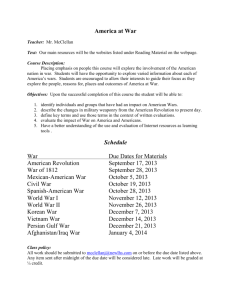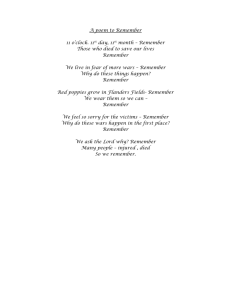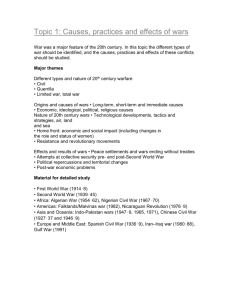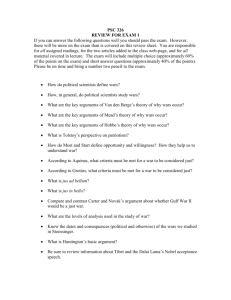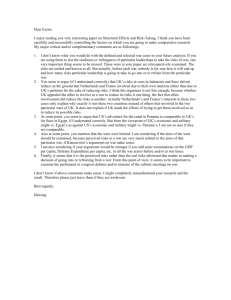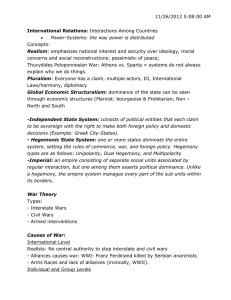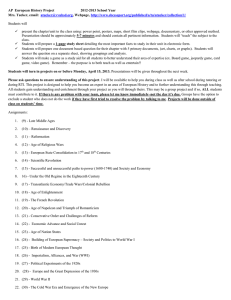Proceedings of Annual Spain Business Research Conference
advertisement
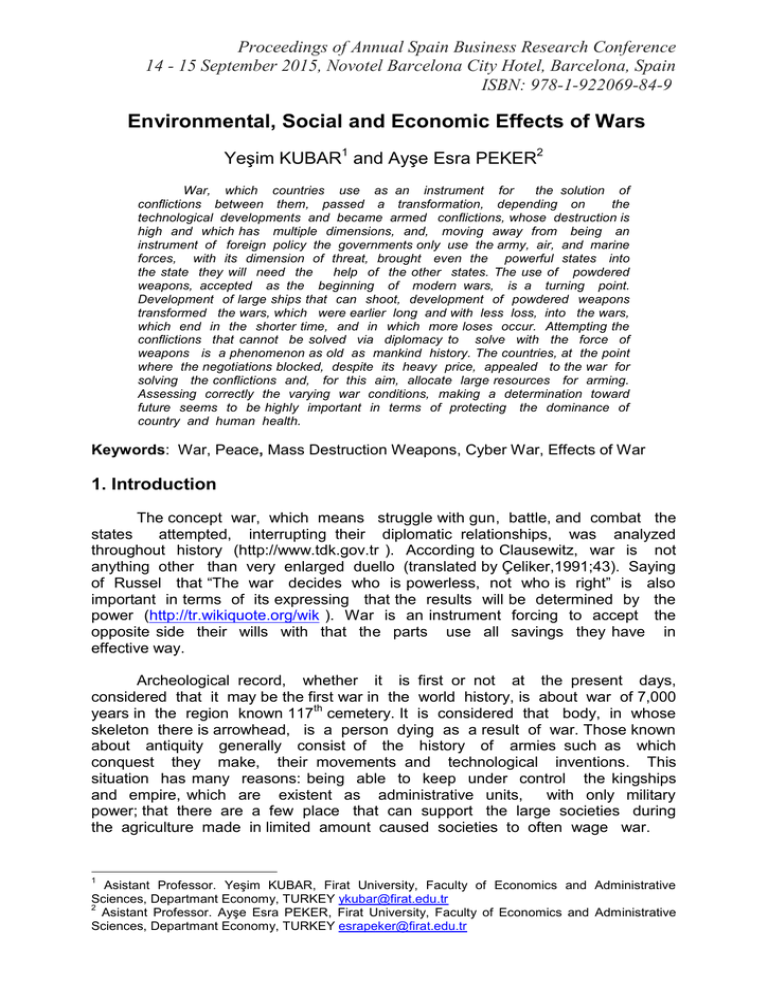
Proceedings of Annual Spain Business Research Conference 14 - 15 September 2015, Novotel Barcelona City Hotel, Barcelona, Spain ISBN: 978-1-922069-84-9 Environmental, Social and Economic Effects of Wars Yeşim KUBAR1 and Ayşe Esra PEKER2 War, which countries use as an instrument for the solution of conflictions between them, passed a transformation, depending on the technological developments and became armed conflictions, whose destruction is high and which has multiple dimensions, and, moving away from being an instrument of foreign policy the governments only use the army, air, and marine forces, with its dimension of threat, brought even the powerful states into the state they will need the help of the other states. The use of powdered weapons, accepted as the beginning of modern wars, is a turning point. Development of large ships that can shoot, development of powdered weapons transformed the wars, which were earlier long and with less loss, into the wars, which end in the shorter time, and in which more loses occur. Attempting the conflictions that cannot be solved via diplomacy to solve with the force of weapons is a phenomenon as old as mankind history. The countries, at the point where the negotiations blocked, despite its heavy price, appealed to the war for solving the conflictions and, for this aim, allocate large resources for arming. Assessing correctly the varying war conditions, making a determination toward future seems to be highly important in terms of protecting the dominance of country and human health. Keywords: War, Peace, Mass Destruction Weapons, Cyber War, Effects of War 1. Introduction The concept war, which means struggle with gun, battle, and combat the states attempted, interrupting their diplomatic relationships, was analyzed throughout history (http://www.tdk.gov.tr ). According to Clausewitz, war is not anything other than very enlarged duello (translated by Çeliker,1991;43). Saying of Russel that “The war decides who is powerless, not who is right” is also important in terms of its expressing that the results will be determined by the power (http://tr.wikiquote.org/wik ). War is an instrument forcing to accept the opposite side their wills with that the parts use all savings they have in effective way. Archeological record, whether it is first or not at the present days, considered that it may be the first war in the world history, is about war of 7,000 years in the region known 117th cemetery. It is considered that body, in whose skeleton there is arrowhead, is a person dying as a result of war. Those known about antiquity generally consist of the history of armies such as which conquest they make, their movements and technological inventions. This situation has many reasons: being able to keep under control the kingships and empire, which are existent as administrative units, with only military power; that there are a few place that can support the large societies during the agriculture made in limited amount caused societies to often wage war. 1 Asistant Professor. Yeşim KUBAR, Firat University, Faculty of Economics and Administrative Sciences, Departmant Economy, TURKEY ykubar@firat.edu.tr 2 Asistant Professor. Ayşe Esra PEKER, Firat University, Faculty of Economics and Administrative Sciences, Departmant Economy, TURKEY esrapeker@firat.edu.tr Proceedings of Annual Spain Business Research Conference 14 - 15 September 2015, Novotel Barcelona City Hotel, Barcelona, Spain ISBN: 978-1-922069-84-9 The most prevalent theory in the literature of international relationships is realism emphasizing that the states are power focus. One of the main assumptions is that state is an actor. The aim of state to survive; therefore, there is no ethics, there are interests. The state, for being able to survive, must either increase its power or balance the power distribution in the system, forming alliances. This viewpoint comes to our face as a case supporting the war. Until 19th century, there were no theoretical studies toward understanding the causes of wars, because humans thought of that the cause of wars was very clear. The governments went to war for the gains or to protect themselves from the attacks of the other governments pursuing the gains. The wars were being started by the government wanting to gain more than loss, gaining victory. When we reached the 20th century, that the wars modified their shapes and the First World War, the largest war Europe saw, initiated war century. For the industrial societies, the thoughts such as large scale death and destruction the weapons that are the products of the advanced technology can make; and the costs, economic collapse, political depression, and etc. war will bring began to appear and the theories of international relationships emerged (http://www.yenith denatilim.com). In this study, the concept war is briefly discussed; the sorts of war and the variation it undertakes, effects it creates on the societies, and its economic, social, psychological, and environmental dimensions are emphasized, and the economic effects of the First and Second World Wars are mentioned about. 2. Why Are Wars Waged? The known history of humankind dates to 5000 years ago and, in this process, humankind became in the war state. In the war history of humankind, the winners, because they obtained booties, enlarged their territories, they captured, formed the rejoiced part, while losers became the part that are sorry. The part winning the war prevailed in the region they live, until it was beaten in another war. When the factors leading humankind to wage war are studied, the different answers were reached. According to somebody, the wars break out with the factor “fear”. The fear of an human from another human, of families from the other families, and of state from another state is accepted the cause of a war. Another cause is the factors such as “jealousy” and “covetousness”. The desires of humans to have the properties they do not themselves have , but the others have resulted in the war. Humans acquired lands they live on as a home in time. The need to defend the home made obligatory to establish an army. Land, from the first day to now, together with underground resources is indispensable value and an important natural wealth for humans. Therefore, acquiring new lands forms an important reasons for wars. There are also the other reasons, related to the concept for war. such as not deeming a society living a certain land worth of that land According to the philosophy based on the era of Roman Empire, if the publics that do not have ability and that are not productive live on the wealthy lands, their countries can be dispossessed; they can dismissed from there, swept away, Another reason is the demand for help of the minorities under press (http://arsiv.ntv.com.tr/). Since the first ages, humans live in a community.. Behind this, there are many factors such as that the human living alone cannot protect Proceedings of Annual Spain Business Research Conference 14 - 15 September 2015, Novotel Barcelona City Hotel, Barcelona, Spain ISBN: 978-1-922069-84-9 himself/herself; that he/she remain inadequate in his/her obligatory needs; and psychological factors. However, with coming together of humans that cannot live alone, the fights were first seen and, following these, with that the fights grow and intensify in time, it was seen that these fights transformed into confliction. Thucydides accounts for the reasons for fights as competition directing the human to the gain, timidity with the dimension of security, and victory directing to the violence (Yalçınkaya, 2004;40). The wars that emerge, from the case, in which the primitive tools replaced to a period, when the modern weapon systems, arms, marine and air operational forces are formed in time. Hobbes, while accounting for the basis of war, with the expression of “Insecurity engenders from inequality” means the closeness of the expectation of reaching the aims with the close ability level. With the desire of having the same thing also emerges hospitality. With the approach that “ War engenders from insecurity”, insecurity emerging due to inequality is base of war. According to Hobbes, for avoiding from the threat resulted from insecurity and inequality, dominating on the other is a right reason, because in lack of a power to keep in peace everybody, courage to wage war urged one part to attack to every part (Uşaklı, 2007;11 ). In historical process, as a real reasons for the wars between states, it is seen that there are imperialist ambitions The underlying reason of both world wars experienced in 20th century is, in the simplest expression, following the imperialist policies, to provide a new zones of influence. Attributing these to the reason of “democratization” and “prevention”, it is seen that international legitimacy is tried to be brought in arming (Uşaklı, 2007:25) Another view toward explaining the reasons for war is a view that wars are existent in the nature of human. According to this view, there are an unsatisfied desire toward ambition, aggression, and reaching power. But, this view is not generally accepted. The subject of war is also evaluated by psychologists and, this issue is analyzed from two different aspects, as the opinion of the scientists such as Feud and Lorenz adopting the method of psychoanalysis that the aggression feature of human is inherent and the views of Wright and Hoebel that humankind do not inherently bring the war and learns it later. Wright said that the primitive men are the people who are the least war loving and war loving proportionally increases with civilization. Hoebel also argued that war tendency is not an instinct and that it is a very developed cultural complexity (Fromm, 2011: 272). According to Hobbes, humans become enemy to each other in view of the desire of having the same thing. They try to destroy each other and becomes dominant on each other. Hobbes said that there were three main reasons for the fight in the nature of human. First of them is competition; second, insecurity, and, third, the sense of fame-honor (Veysal, 2006: 46 ). Malthus argued that the wars balanced world population in such a way similar to diseases and droughts (Veysal, 2006: 56) .Ibn Haldun claimed that the first reasons for war resulted from the sense of revenging of humans from each other. According to Haldun, sense of revenging may engender the effort, anger, competing in any issue, and mutual enemy, and this kind of sense occurs between the communities and clans becoming enemy to each other (Haldun, 1989: 37). According to Haldun, the second reason for war is enemy. The third reason for war is to wage war for the sake of God and religion. Proceedings of Annual Spain Business Research Conference 14 - 15 September 2015, Novotel Barcelona City Hotel, Barcelona, Spain ISBN: 978-1-922069-84-9 War became a valid institute in Western societies. In the technical and social conditions of Western societies, war was used as a destroying instrument for many times (Toynbee, 1997: 15). Grotius emphasized the reasons showing the war right. Defending what we have and trying to obtain what is owed to us can be deemed as the right reasons for wars. Humans can enter the war to protect their lives. If the danger is unavoidable, the war can be undertaken (Grotius, 2011: 74-75 ). Tolstoy suggested that the wars should be examined with their real reasons, not visible reasons. He uttered that saying as the reason for Russia –France War is the warlike spirit of Napoleon and patriot decisiveness is as nonsense as saying that an impassable mountain collapsed since the last worker stroke the last pickaxe to it (Tolstoy, 2010: 27). 2.1. The Characteristics of War and Concepts It Formed in Societies It is possible to express the characteristics of war as that there is a case, which cannot be solved with the other methods; that a decision to apply violence is made as a radical solution; that the wars are used in an organized way; that the war has a past and future; that the success cannot be reduced to only the military successes; that the war has a high cost; that is a high participated action shaped by dominants with certain operations; that it contains to impede the will of rival and to get it accept its own will; that although the monopolism to use power is in the government, every kind of political authority targets to expand, as a general logic of using violence, acquiring the economic resources and strategic facilities; that the parts of war should search for the alliance to themselves; and that the war accelerates the national or international change (Dedeoğlu,2006;25-30). War required the material and spiritual force .In every period, the part, whose material and spiritual power is high, won the war. Therefore, the parts that wage war used the people, who are powerful and strong, i.e. the young population in the war areas. In the societies, those going to war were sent with ceremonies; those dying in the war were called “hero” and “ martyr”; and they were buried with applauses and prayers . The monuments was built to those showing “bravery” and title of “veteran” to those injured in the wars. Every war area mostly became the cemetery of the young people.. Sometimes, in view of the lasting wars, even the need for burial of those dying cannot be met; those dying were buried into collective cemeteries. The wars did not end in the war areas in their all dimensions. Those waging war nursed grievance to each other; grudge and hate accompanied the following destructions and life loses. In any period of history, any long period, when there is no war and destruction, was not experienced. In 1960, a Norwegian statistician, in a study he carried out, over 5560 years from human ’s inventing the script to the date, when the study was carried out, calculated that 14,561 wars broke out; and that there occurred 2.21 wars per year (Bayat, 1985: 72) . During war, those sheltering to the other countries took the names such as refugee. The concept capture also emerged together with wars. During and after war, the cases such as profiteering, black-market, and looting occurred. Wars became one of the causes of the foreign migrations. Humans, in order to live in more secure and peaceful environment, were obliged to replace. Proceedings of Annual Spain Business Research Conference 14 - 15 September 2015, Novotel Barcelona City Hotel, Barcelona, Spain ISBN: 978-1-922069-84-9 2.2. Sorts of War and Social Effects of War The struggle between states or communities can be experienced in the different ways. It is difficult to classify the wars in a completely discriminable way Mostly, some sorts of war can be together executed or can begin with a sort and sustain with the different sorts. The wars can be classified as personal, feudal, dynasty, national, and religious wars; according to their intensities, as limited and total wars; and according to the geographical criteria as general and local wars. Interstate war is a sort of confliction, which is generally executed on a country, and experienced between states. Civil War: In the recent years, interstate wars were began to replace with civil wars, in which non –state actors such as guerilla groups, resistance movements, and terrorist organizations participate. It is an armed struggle, executed between the organized groups within the state, to generally take the state under control or to found a new state. Conventional War: Instead of randomized and momentary attacks, conventional wars are organized wars due to the fact that they are executed by the armed forces or the educated warriors showing effectiveness around a strategy, Total war, mass destroying the civilian and military enemy targets, is a war holding an aim to provide unconditional surrender of enemy and in which all society participate with a comprehensive compulsory military service and, directing the economy to the military aims. Hegemonic war, reorganizing the global power balance, is a war to establish dominance all over the world. Guerilla War: Its lexical meaning is “small war”: It is a resistance or public war, which makes emphasis to the elements of mobility and surprise, rather than superior fire power, and which is executed by the irregulars that use tactics in compatible with land (http://www.libertedownload.co). Chemical War is a war, carried out with the substances in the state of solid, liquid, gas or aerosol, which, thanks to its chemical properties, shows a killing, injurious, and iritating influences; which generates the smog and fire; and which is effective on the plants and metals Biological War: It is the deliberate use of microorganisms in order to give rise the damage in the human, animals, and plants, and to give damage the material (sivilsavunma.ogu.edu.tr/ppt). Right to live is accepted as the most important legal-humanistic criterion showing the civilization level of a country in our age. Every right of human beings must be protected. However, with the wars, humans devoid of right to live. Although war turns the economic order upside down, it directly affects the human of that region. The wars bring many diseases together with them. The patients become not being able to medicine and even hospital. After war, life conditions become difficult. Humans experience troubles from spiritual and physical point of view and these troubles affect the women and children much more. The effect of war on the human life is most. The effects of war show themselves in every area. These effect are permanent and can continue for very long time (https://sites.google.com/site/mervebaylas). After the First World War, because one hundred thousands of soldiers stayed in the bulwarks full of mad, dirty, and death over 4 years, most of the soldiers could not be rid of psychological effect of war A trauma, called bomb shock and seen very Proceedings of Annual Spain Business Research Conference 14 - 15 September 2015, Novotel Barcelona City Hotel, Barcelona, Spain ISBN: 978-1-922069-84-9 prevalently among veterans, led the patents to experience the bouts of intensive fear and trembling. The trace of war not only permeated the souls of some soldiers but also their bodies and ten thousands of soldiers lost their arms and legs in the war field. That there are many soldiers, whose eyes, noses, or chines were fractured caused, in the European countries. special masques to be produced for these humans to use (ttp://www.msxlabs.org/forum/tarih/4338) Despite the destructiveness of war, attention was attracted that it had the positive aspects for societies. According to some views, war increases the physical power and reduces the weakness. The pure and noble senses of peace art engender from the wars. All nations learn the realities and the power of thought from the wars. The spiritual senses of nations increases during wars, while their weaknesses rise in the time of peace. There are also views arguing that the wars are means to maintain the order of God. Preventing the wars, which are as old as humankind history is a subject of discussion. According to the views, which are optimistic about this issue, human being demolishing the slavery system that are existent since the first day of history has also power to be able to eliminate the wars. Erginsoy classified the periods of war as animal period of war, primitive period of war, civilized period of war, and modern period of war. The wars can be divided into two groups as general wars and regional wars according to their prevalence (Bayat, 1985: 73). According to the weapons used, the wars are divided into three as conventional wars, nuclear wars ( strategic nuclear war, tactical nuclear war), and limited wars (Bayat, 1985: 61). The wars can occur between people, nations, regimes, commanders, and even world leaders (Page, 2000: 445). Wright divided the wars into four: Defending Wars, Social Wars, Economic Wars, and Political Wars. Wright, in the studies he carried out, said that the humans experiencing in the primitive periods are the least war loving and that war loving proportionally increased with civilization (Aktaş ve Safran,2013;1590 ). These findings contrast to the claims that destructiveness is existent in the human nature. Hogo Grotius evaluated the wars judicial point of view. According to Grotius, wars are divided into two as right wars and unfair wars. The most important one of causes of the right war is that somebody, against whom we wage war earlier made unfairness to us (Grotius, 2007: 73 ). But, after the last quarter of 18th century, wars underwent to the important changes. French revolution wars and establishment of mass armies, based on the compulsory military service of the citizens of Napoleon era began to enlarge the time and scope of wars. Napoleon Wars (1803-1815) are accepted as the first total wars (Beşikçi: 2010: 63 ) Crimean War is deemed as a corner stone in the pass to the modern wars. The armies are managed for long time and, during the war, steam ships and telegram were used.1861-1865 American Civil War can be deemed as the first large modern war in history. During American Civil War, the armies were transported via railways and supported; the steam ships mutually waged war; the armies were managed by telegrams from time to times; and serial fire guns were used (Akad, 2011: 14 ). That the management is acquired by the parliaments and mass, being taken from the hands of kings is the most important cause of that the war becomes total and absolute. At the point, where the ruler gives up, the armies do not give up and, face up to very large disasters, the wars are continued (Akad, 2011: 12). Proceedings of Annual Spain Business Research Conference 14 - 15 September 2015, Novotel Barcelona City Hotel, Barcelona, Spain ISBN: 978-1-922069-84-9 In 1993, Samuel Huntington, in the paper titled “Confliction of Civilizations ”, said that the wars in the future will occur between cultures, especially between Muslim and Christian world (Wells, 2009: 141). Today, the most prevalent wars are seen to be civil wars. Besides this, terrorism events include a great danger for humankind. The kind of war that is both very different from the wars and creates dreadful effect, developed in 21st century and dated to the present days, is Cyber Wars. Cyber War is a name given all actions executed to protect the cyber spaces and existences in it. Attacking the targets, determined as enemy to the attempts of cyber-attack, making a cross –defense, and collecting intelligence data in the cyber space in target constitute the cyber war activities. The main target of cyber wars is the infrastructures of information system of the critical sectors of countries such as security, health, energy, transportation, communication, water, banking, and public services (tps://www.bilgiguvenligi.gov.tr ). The instruments of cyber media, used to make ineffective the counter side, to damage it, and to steal data, are referred to cyber weapons. Cyber Wars arec also termed as 5th Dimension War. It is determined as 5th war area of human being after the land, marine, air, and space. Cyber War is to reach the information systems under the computerized control of enemy in hidden and invisible through internet, in order to collapse it psychologically (http://ylt44.com/bilimsel/siber.html) Acquiring control is to steal information, modify, collapse, or mislead. Cyber War is that a state acts to create an damage or interruption, permeating the computer system and networks of another state. Cyber war incorporates many methods and techniques within itself. There are working areas that can be used in the area of cyber war. Many areas such as the breakdowns of systems via intelligence manipulation, propaganda, taking communication under control, viruses, and Troy horses; sabotages with cyber bombs; system interlocking; fraud; and information pollution contribute to the formation of cyber war (Kara,2013;40). A large part of the budgets of countries are allocated to war. While approximate cost of a bomber aircraft, fighter plane, or Cruise missile that is not caught by radars is expressed in millions dollars, the cost of products used in the cyber media is very lower and easy to obtain them, because the products we need computers and their software. Through a computer, more damage can be brought than a large army with full equipment brings damage. The target we damage includes every kind of area of the country, not only the military systems. The systems of countries, integrated with cyber medium, present the benefit of developedness: Also integrating with cyber medium means to be open to the cyber threats and, more badly, the areas cyber weapons threaten form a backbone of a country. 2.3 Environmental Effects of Wars Wars cause to destruction via the secondary damages and intentional devastation. Environmental destruction and devastation of living environments are used as a war winning strategy to eliminate the enemies. The environmental effects of modern wars are collected in three groups as the environmental effects forming during the preparation for war, environmental effects forming during war, and environmental effects emerging after war. Proceedings of Annual Spain Business Research Conference 14 - 15 September 2015, Novotel Barcelona City Hotel, Barcelona, Spain ISBN: 978-1-922069-84-9 The effects of preparation for war on the environment are expressed as rearranging the environment according to the needs of army for the armed forces to place in the region, devastating the natural structures; environmental pollution forming the preparation of weaponry systems; testing the weapons; and direct destroying effects of military drills to the environment. Military aimed airways, armories, military bases and large lands are required. Land of millions of acres allocated for the production, storage, and test of weapons (chemical, biological, nuclear, and conventional) have been polluted at the advanced level at the present days and, bringing them in the natural life, even if military aimed use were interrupted, is almost impossible. There is a need for large lands for military drills. During these drills, land and air bombardment, for the reasons such as the movements of tanks and armored vehicles, all natural structure is devastated. As a result of this situation, the negative environmental effects such as soil pollution, pollution of underground and aboveground water resources, air pollution, and getting harmed of wild life in the region emerge (Soysal, 2005: 48 ). Wars became more destructive with war technologies developed in 20th century. Chemical, biological, and nuclear weapons, long range missiles, and air bombardments both made the civilians target and caused more and long timed environmental devastation. Especially beginning from the Second World War, seeing and bombing the industrial plants, infrastructure systems of cities, and civil zones of occupation both raised the civil loses over the military losses and caused the environmental devastations, also showing its effect after war. Even today, the destructive influences of atom bombs released by US to Hiroshima and Nagasaki are observed. Modern weapons used Kosovo and Gulf Wars became deadly both with their explosive effects and the poisonous chemicals and radiation they contain and created a devastative influence on the environment (Soysal, 2005: 49). During 1st Gulf War, millions of barrels of raw oil were diffused over Persian Gulf; millions of seabirds died; the oil wells in the desert were devastated; and the animals and plants exposed to the bioturbation and disappeared. In addition, diffusion of tons of dirty gas over atmosphere caused to snowing in Kashmir, while in Iran and India to land rains (Berberoğlu, 2008). In the years of war, in general, the profit the use of resources, illegally sustained, brings gave an opportunity for a handful of people to be able to become rich and the various groups to buy plenty of weapons However, these conflictions brought the violations of human rights, human disasters, and environmental devastations for most of the local publics, and in turn, pulled these countries to the bottom part of human development criteria (Şakacı, 2008;18 ) Nowadays, the long timed negative effects of modern weapons on the environment cause the humans to engage in the large environmental devastations emerging after the war. The infrastructure, brought into unusable with bombardments, destroyed forests, soils becoming inefficient, radioactive pollution, aboveground and underground water resources becoming not usable by being polluted lead to the human losses and even large migrations in also post-war period. These migrations, mostly led to the excessive population movements and environmental problems in the regions migrated In addition, that the humans change their countries collectively can cause the conflictions and instabilities in the country left or the country or region arrived . The land mines, planted in the war period, lead to the serious civilian losses after war as well. Collecting land mines, used due to the fact that Proceedings of Annual Spain Business Research Conference 14 - 15 September 2015, Novotel Barcelona City Hotel, Barcelona, Spain ISBN: 978-1-922069-84-9 they are practical and cheap, is difficult and expensive. . Therefore, acres of lands ( particularly agriculture) in the old confliction regions remain closed for use (Soysal, 2005: 48 ). The reason for that about 2 millions of unexploded bomb in the region after Gulf War is that the permanent effect of the use of large area effective bombs . That is, for these pieces of these bomb to be able to make ineffective, it is necessary for them to be exploded. In addition, differently from land mines, the places of these pieces of bombs are not known (Tuna, 2003:154 ). Extermination of poisonous military wastes and the weaponry systems that become old also cause the environmental pollution. Today, it is known that the area over 20,000 are polluted with the poisonous military wastes. The limited resources of the world, in spite of all of these problems, are increasingly used for war. 2.4. Mass Destruction Weapons and Their Effects The term of mass destruction weapons (MDW) having effect on the transformation of war is used for the weapons that will lead to large amount of deaths. With the expression of MDW, what is meant is the nuclear, biological, and chemical weapons. The expression of MDW was first used for the air strike, to which the city of Guernica, Spain, exposed in 1937. MDW has spread all over the word with a high speed since 1945. MDW are the weapons in quality that will create clear differences in the future wars. This, in fact, supports the argument that technology transforms war. The concept, often used, especially, in post- cold war period and, beginning from that Iraq occupied Kuwait, pronounced in the relevant UN decisions, became more often pronounced after September 11 attacks and placed in the political and academic life including the daily language (Denk,2011;94). Toward preventing MDW from becoming widespread, on the one hand, especially in the scope of press and international law, particularly applied to some states, while the agreements toward preventing these weapons from using are made, on the other hand, the efforts toward developing more deathful weapons that are not against these agreements are carefully followed. The use of MDW is based on a long history. Among MDW, nuclear weapons were firstly produced in two sorts during World War II in a framework of a program, known in US as Manhattan project, First of these is atom bomb with plutonium and it was first time tested in Alamogordo, US, on the date of July 16, 1945. The second one is atom bomb with uranium and even without being tested, was used in Hiroshima, Japan on the date of August 6, 1945. Except for 5 countries (US, Russia, China, France, and United Kingdom) officially having nuclear power, Pakistan and India are accepted non-official nuclear power (http://www.tuicakademi.org ) Biological weapons are the ones showing its effect, affecting the human metabolism. Following the dispersion of the bacteria or viruses, which are microbes that proliferate by breeding, to the target zone, they reach the local people and spreading from the person to person, show their real effects. According to the declaration made by NATO and US centered Control and Prevention Crevice for Disease, anthrax , smallpox, plague, thalassemia, hemorrhagic fever factors, and botulism toxin are the potential biological weapons that are the most important and whose use are the most possible Chemical weapons are the substances, produced to make a physical and psychological devastation effect on human, benefiting from the poisonous Proceedings of Annual Spain Business Research Conference 14 - 15 September 2015, Novotel Barcelona City Hotel, Barcelona, Spain ISBN: 978-1-922069-84-9 features of chemical substances. That these substances, due to their being lifeless, proliferate or spread from human to human is not under consideration. However, due to the chemical substances they contain, they have devastating effects on human. 2.5 Effect of War on Health The use of mass destruction weapons and every kind of war have the large and important effect on the health of humans. One of the largest negativities the war media bring is contagious diseases. Together with increase of migrations after wars, the epidemic diseases such as cholera, typhus, plague, pox, Spanish flu, and etc. become widespread in front. The contagious diseases the civilians mostly affected, not only the soldiers in front. Thus, the number of the deaths because of epidemic diseases among civilian life became more than the member of those dying again because of epidemic diseases (Çalık and Tepekaya,;206). In wars, the losses the army give due to the epidemic diseases are in the amount of extremely high and important. During World War I and II, preventing the epidemic diseases from spreading and struggling with diseases became a part of war strategy. In many wars, it was seen that the number of soldiers dying due to cholera, typhoid, and dysentery was more than those dying during conflictions. The wars, made executed successively, played an important role in the spread of the epidemic diseases. (ttp://www.eraren.org/index ) Among the negative effects of war, the increase of the probability of seeing the breast cancer, leukemia, thyroid cancer, and brain tumor take place. The damage the war and war wastes bring does not only remain limited with the proliferation of cancer sorts. Due to the fact that the immune system of the children coming into world after the war is extremely weak, the children suffered from war will enter under a great risk. The wastes in the air, water, and food, passing from mother’s womb to the baby, may make active the passive effect in the mother and father . That is, since a child, whose parents are healthy, comes into world from the mother and father, exposed to war, can be obliged to bear the heavy load of war. The chemical substances used in the production of various chemical weapons or explosives used during war and wastes affect the respiratory system and raise the risk the children are caught to the diseases such as asthma and bronchitis. In addition, in respiratory tract and lungs of the children, directly exposed to the disease, the serious injuries chemical substance leads to are observed. One of the negative effects of war on human health emerges on the skin. The chemical substances used during war leads to the serious injuries on the face of skin and the injuries requiring a long time treatment, due to lack of hygienic medium during war, sends invitation to the other microbial diseases. As in hot war, war syndrome also threatens the public health Particularly, psychological point of view, due to war syndrome negatively affecting humans, the disorders such as headache, high blood pressure, nausea, and tachycardia emerge (www.bilgilersitesi.com/savasin) Proceedings of Annual Spain Business Research Conference 14 - 15 September 2015, Novotel Barcelona City Hotel, Barcelona, Spain ISBN: 978-1-922069-84-9 3. Effects of War on Economy In the war period or in the periods, when there is probability of war breaking out, economic situation, in which the economic resources are directed to the production of goods war require, and decisions of the production, sharing, and consumption are under control of government, are defined as war economy. One of the most important study areas of war economy is the cost of today’s war to the future generations. The real costs consist of the financial burden resulted from financing today’s wars, which reflect to the future generations as well as the difference between economic welfare today’s generations will have, if the war does nor breaks out, and welfare level they actually have after war, and decrease in the quality of population due to war. In the framework of cost to the future generations, due to the fact that preparation for war, an important part of labor force is drawn from the productive sector during war, and that they lose the qualifications civil economy requires in this process, for them to be again brought in the economy after war, it is also necessary to consider the necessary comprehensive educational programs, in spite of this, that they remain unemployed, and, thus, the costs they will charge to society (Öztürkler,2015;88). When we regard to the economic results of 1 st and 2nd World War, First Word War led to the death of 10 million of soldiers, and seriously being injured of 20 million of them. A serious loss occurred in terms of population and its negative effect from the point of labor had been quite large. When it is considered that those dying and remaining disabled are young population, it is seen that this effect is very large and important. Just as in every period of war, also in the period of First and Second World War, military expenditures increased and, due to the fact that that the war lasts long and it affects many countries at the same moment, it had a large effect in terms of indirect cost and, in the period of war, the houses, industrial plants, mining sector, agricultural and livestock, transportation vehicles and communication systems exposed to a large damage and wear in the period of war. In war years, what is more important than physical destruction from the economic point of view is disturbance of economic relationships. This case was also experienced in the First and Second World War and, especially, foreign trade was upside down. Overseas countries were obliged either to produce on their own or buy from Europe. In the First and Second World Wars, inflation became an important problem at national and international level. During war, as a result of that the countries appeals to borrowing in large scale and print banknotes to finance the war, the rise of prices, foreign trade rates disturbed, due to price rises, led international trade to attenuate. Second World War had been the most destructive and prevalent war of the world. After war, the institutional framework of economy had a heavy injıry. After war, all Europe remained in poverty and, for rebuilding European economy, more governmental interventions were needed; the sectors such as energy, transportation, and banking were nationalized; and social security systems such as pensions and free of charge medical care became widespread. After war, scarcity of goods were experienced. In the period after Second World War, as a result of state of that Europe is devoid of Proceedings of Annual Spain Business Research Conference 14 - 15 September 2015, Novotel Barcelona City Hotel, Barcelona, Spain ISBN: 978-1-922069-84-9 everything, for preventing socialism from spreading in Europe and development of many countries, the foundation of Marshall plan were laid down. Rebuilding economies was defined as economic miracle and the factors playing role in this economic miracle were expressed as intergovernmental cooperation and human capital. Wars exhibit a characteristic leading many sectors in economy to fall behind and country economy to downsize in the large rates. The results of study carried out revealed that in periods of war, particularly agricultural sector, mining sector, foreign trade, stock market and banking sectors, and tourism sector were affected Even if the use of the word war badly affects tourism sector and stock market. War, from the aspect of not using the resources in country economy effectively, environmental pollution, pollution of water resources, disorder of human health, and struggling with contagious disease, it makes obligatory to bear the high costs from economic point of view. The resources and budget of country downsize and a prosperous life exchanges with the life that is poorer and has disease. Country economies downsizes and this forms a barrier in front of economic growth and development, especially sustainable development Conclusion War targeting living right taking place among human rights, is the most terminal point of violations of human rights. War, due to the political, economic, biological, psychological, and environmental effect, is the most destructive action, directed to human and produced by human. War comes to our face as a phenomenon existing since the old ages. Sometimes political conflictions and sometimes conflictions of economic interest entrained the countries to the wars sometimes, experienced in the regional dimension, and sometimes in the country dimension. Together with wars, the weapons and armies developed and wars became larger and deathful. One of the largest negativities wars bring is contagious diseases and, consequently, emerging the deaths of civilians and soldiers. In the period dating to 20th century, wars were actualizing in the form of front wars with facing to each other of soldiers of two armies on a front and, during wars, only soldiers were dying. In 20th century, a new sort of war engendered and the only soldier no longer died and all humankind became the target of war. Wars began to show a characteristic affecting all over the world, not only a few countries. Technological developments as a historical reality, transformed the wars of today and has been continuing to transform. This continuing transformation is experienced in terms of the causes, parts, executing style, and scope . Wars moving away from being the instrument of foreign policy, experienced between states at the present days, transforming with the various causes, especially technological developments, led increasingly the various groups to stand out. The war, attacks, and defense techniques of countries showed a change. The land mines planted during war, later, threaten the right to live and, due to its breakdown of body integrity, form a serious problem. Following ending of war, the uncertain mine area spread the effect of war to the long period. The mass immigrations and becoming refugee that appear among the dramatic results of war constitute two very important issues that should be emphasized. As consequence of wars, a very number of collective Proceedings of Annual Spain Business Research Conference 14 - 15 September 2015, Novotel Barcelona City Hotel, Barcelona, Spain ISBN: 978-1-922069-84-9 immigrations become permanent due to the inadequacy of international mechanisms and this state creates a deep effect on the life of humans and country economy. Whatever sorts war are of, they always form large costs on the human, environment, economy, and systems; cause the scarce resource on the world to be used in the destructive and deathful areas, rather than more productive area; the right to live of future generations to be taken away; and comprise a big barrier in front of sustainable growth and development. War shows a characteristic, whose multiplier effect is high, which has destroying and destructive but develops together with the history of humankind; and whose negative effect grows as it develops. Mass destruction weapons and chemical weapons that are used creates the effects almost impossible to repair on both humans and above ground and underground resources For the life to continue, it is necessary to meet the obligatory needs. However, war and its implications make the resource unusable or leads them to disappear. The waste substance of defending industry pollute both the soil and environment and negatively affect the human health. For the wars bringing high cost damages and endangering national security, international cooperation and peaceful [ attempts ] are obligation. “Peace in the world and peace in home” is sine qua non for life. References Akad, M. T. (2011), 20. Yüzyıl Savaşları, İstanbul: Kastaş Yayınları. Aktaş Özgür ve Safran Mustafa (2013), International Periodical For the Languages, Literature and History of Turkish or Turkic, Turkish Studies ,Volume 8/8 Summer, 1587-1619, Ankara. Andrew Heywood, Küresel Siyaset, http://www.libertedownload.com/Ornek/Kuresel_Siyaset_OS.pdf, (15.05.2015). Bakır Emre (2012), 5. Boyutta Savaş: Siber Savaşlar – I, https://www.bilgiguvenligi.gov.tr/siber-savunma/5.-boyutta-savas-siber-savaslar-i.html (23/04/2015). Bayat, M. (1985), Harp ve Sulh (III), Belgelerle Türk Tarihi Dergisi, sayı 5, Temmuz, 66-73. Beşikçi, M. (2010), Son dönem Osmanlı Harp Tarihi Ve Topyekûn Savaş Kavramı, Toplumsal Tarih Dergisi, Haziran, 198, 62-69. Berberoğlu, Oya (2003), Savaşın Çevre Felaketi, http://www.aksam.com.tr/ arsiv/ aksam/2003/02/08/yazarlar/yazarlar162.html, (15.05.2015). Beril Dedeoğlu, “Savaş”, Uluslararası İlişkiler Giriş Kavram ve Teoriler, (ed. Haydar Çakmak), Ankara, Platin Basın Yayın Dağıtım, (2006), 25-30. Bertrand Russell, http://tr.wikiquote.org/wiki/Sava%C5%9F#Bertrand_Russell, (17.05.2015). Carl Von Clausewitz, Savaş Üzerine, (çev. H. Fahri Çeliker), Ankara, İkinci Baskı, Genelkurmay Basımevi, 1991,43. Çalık Ramazan ve Tepekaya Muzaffer, Birinci Dünya savaşı Esnasında Anadolu’daki Salgın Hastalıklar ve Ermeniler, dergisosyalbil.selcuk.edu.tr/susbed/article/download/521/503, (22.05.2015). Devletler birbiriyle niye savaşır? http://www.yenidenatilim.com/?pnum=8031&pt=%20Devletler%20birbiriyle%2 0niye%20sava%C5%9F%C4%B1r?, (15.05.2015). Proceedings of Annual Spain Business Research Conference 14 - 15 September 2015, Novotel Barcelona City Hotel, Barcelona, Spain ISBN: 978-1-922069-84-9 Dünya Savaşı ve Etkileri, http://www.msxlabs.org/forum/tarih/4338-dunya-savaslarive-etkileri.html, (15.05.2015). Erdem Denk, Bir Kitle İmha Silahı Olarak Nükleer SilahlarınYasaklanmasına Yönelik Çabalar, Siyasal Bilgiler Fakültesi Dergisi, 66(3),2011,93-116. Erich Fromm, Kendini Savunan İnsan, Çeviren Devrim Doğan Yüzer, İzmir, İlya İzmir Yayınevi, 238-239. Grotius, Hugo (2011), Savaş ve Barış Hukuku. (Çev. S. L. Meray), İstanbul: Kurtiş Matbaası. Fromm, Erich (2011), İnsanda Yıkıcılığın Kökenleri. (Çev. Ş. Alpagut). İstanbul: Payel Yayınları. Haldun Yalçınkaya, Devletlerin Dış Politika Aracı Olarak Kullandığı Savaşın Soğuk Savaş Sonrası Değişimi, Yayınlanmamış Doktora Tezi, İstanbul, İstanbul Üniversitesi, 2004, 40. İbn Haldun. (1989), Mukaddime, cilt II. (Çev. Z. K. Urgan), Ankara: Maarif Basımevi. James Martin, Center for Nonproliferation Studies, “Chronology of State Use and Biological and Chemical Weapons Control”, http://cns.miis.edu/research/cbw/pastuse.htm, (11.05.2015). Kara, Mahzure (2013), Siber Saldırılar - Siber Savaşlar ve Etkileri, http://openaccess.bilgi.edu.tr:8080/xmlui/bitstream/handle/11411/346/Siber%20 Karaca Kayhan, Neden Savaş, http://arsiv.ntv.com.tr/news/201927.asp?cp1=1, (21.04.2015). Kitle İmha Silahları, http://www.tuicakademi.org/index.php/temel-kavramlar/4496kitle-imha-silahlari-weapons-of-mass-destruction, (21.04.2015). Kitle İmha Silahları, sivilsavunma.ogu.edu.tr/ppt/KBRN.ppt, Merve Barlas, Savaşın İnsan Yaşamına Etkileri ve Zararları, https://sites.google.com/site/mervebaylas/savasin-insan-yasamina-etkileri-vezararlari, (25.04.2015). Özdemir Hikmet (2005), Salgın Hastalıklardan Ölümler 1914-1918, http://www.eraren.org/index.php?Lisan=tr&Page=DergiIcerik&IcerikNo=18, (05.04.2015). Öztürkler Harun (2015), Savaş Ekonomisi Ve Ortadoğu da Savaş Ekonomisi-I, Ortadoğu Analiz, Mart-Nisan,7(67). Page, J. S. (2000), Can History Teach Us. Peace Review, 12(3), 441-448. Savaşın Yaşama Hakkını Tehdit Ettiğine Dair Poster ve Yazı, http://www.bilgilersitesi.com/savasin-yasama-hakkini-tehdit-ettigine-dairposter-ve-yazi.html, (06.04.2015). Soysal Ahmet (2005), Birinci, İkinci Körfez Savaşları Ve Çevre, Irak’ta Savaş ve Sağlık, Türk Tabipleri Birliği Yayınları, Ankara, 47-53. Şakacı Bilge Kağan (2008), Savaşın Çevre Üzerindeki Etkilerinin Değerlendirilmesi,ÇalışmaOrtamı,http://calismaortami.fisek.org.tr/wpcontent/ uploads/calisma_ortami101.pdf, (18.05.2015). Tolstoy, Lev (2010), Savaş ve Barış, Cilt I, İstanbul: Can Yayınları. Tonybee, A. (1997), Savaş ve Uygarlık (Çev. M. Dündar), Ankara: Ürün Yayınları. Tuna, Gülgün (2003), Küresel Ekonomik, Ekolojik ve Sosyal Tehditler, Nobel Yayın Dağıtım, Ankara. Türk Dil Kurumu Türkçe Sözlüğü, Savaş Nedir?, http://www.tdk.gov.tr/TR/SozBul.aspx?F6E10F8892433CFFAAF6AA849816B2EF05 A79F75456518CA, (20.05.2015). Uşaklı A. Bülent (2007), Savaşın Dönüşümünde Teknolojik Gelişmelerin Etkisi, Atılım Üniversitesi , Sosyal Bilimler Enstitüsü, Uluslararası İlişkiler Anabilim Dalı, Yüksek Lisans Tezi, Ankara. Proceedings of Annual Spain Business Research Conference 14 - 15 September 2015, Novotel Barcelona City Hotel, Barcelona, Spain ISBN: 978-1-922069-84-9 20. yüzyılda Dünya Ekonomisi, www2.aku.edu.tr/~mmasca/Unite_10.ppt, Wells, Karen (2009), Childhood in a Global Perspective, Cambridge: Polity Press. Veysal, Çetin (2006), Savaşın Felsefesi, İstanbul: Etik Yayınları.
